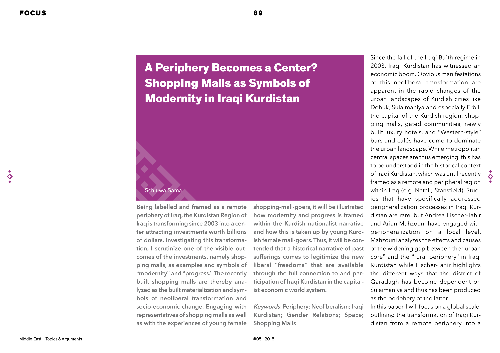A Periphery Becomes a Center? Shopping Malls as Symbols of Modernity in Iraqi Kurdistan
Being labelled and framed as a remote periphery of Iraq, the Kurdistan Region of Iraq is transforming since 2003 into a center attracting investments worth billions of dollars. Investigating this transformation, I scrutinize one of the visible outcomes of the investments, namely shopping malls, as e...
I tiakina i:
| I whakaputaina i: | Middle East - Topics & Arguments |
|---|---|
| Kaituhi matua: | |
| Hōputu: | Artikel (Zeitschrift) |
| Reo: | Ingarihi |
| I whakaputaina: |
Philipps-Universität Marburg
2015
|
| Ngā marau: | |
| Urunga tuihono: | Urunga tuihono |
| Ngā Tūtohu: |
Kāore He Tūtohu, Me noho koe te mea tuatahi ki te tūtohu i tēnei pūkete!
|
| Whakarāpopototanga: | Being labelled and framed as a remote periphery of Iraq, the Kurdistan Region of Iraq is transforming since 2003 into a center attracting investments worth billions of dollars. Investigating this transformation, I scrutinize one of the visible outcomes of the investments, namely shopping malls, as examples and symbols of "modernity" and "progress." The recently built shopping malls are thereby analyzed as the built materialization and symbols of neoliberal transformation and socio-economic change. Engaging with representatives of shopping malls as well as with the experiences of young female shopping-mall-goers, it will be illustrated how modernity and progress is framed within the Kurdish nationalist narrative and how this is taken up by young Kurdish female mall-goers. Thus, it will be contended that a historical narrative of past sufferings comes to legitimize the new liberal "freedoms" that are available through the full connection to and participation of Iraqi Kurdistan in the capitalist economic world system. |
|---|---|
| DOI: | 10.17192/meta.2015.5.3642 |
